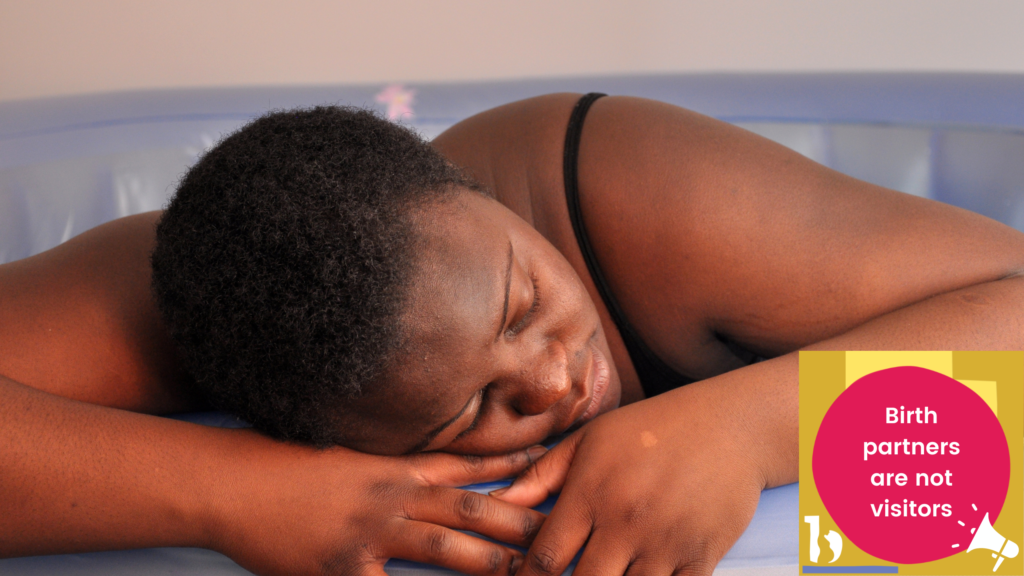Partner restrictions: Information for healthcare professionals

Why birth partners are important from a healthcare-perspective.
When in the process of labour, giving birth and post-partum, having a supportive birth partner of choice** can make a huge difference for women and birthing people, giving them a sense of control, calm and support, which can subsequently reduce their risk of complications.
Birth partners are also often able to provide extremely important emotional and practical help in the early days and hours after having a baby, that sadly midwives are not always supported by their management to provide on the postnatal ward, due to extreme staffing shortages.
There is increasing evidence from the fields of developmental psychology, neurobiology, and psychotherapy that infancy is a crucial time for brain development. It is vital that women and birthing people, and their families, are supported during this time to practice and promote healthy and secure attachment with their babies.
In 2021, Birthrights commissioned a post-COVID-19 analysis of ‘The Role of Maternity Services in Reducing the Prevalence and Cost of Perinatal Depression and Anxiety’. The resulting article cited social support as a key protective factor in preventing mental health complications post-partum, and studies have found that maternity services which facilitate the involvement of partners in maternity care could greatly reduce the cost of maternal mental health to the NHS by up to 50%.
** Here it is vital to emphasise that the risk a perpetrator of domestic abuse poses as a birth partner to women and birthing people should always be thoroughly and very carefully assessed in decision-making around birth partner restrictions, alongside the safety of a pregnant women and birthing person.
The Royal College of Midwives and Royal College of Obstetricians and Gynaecologists make absolutely clear that pregnancy can often be a trigger for domestic abuse, and existing abuse may get worse during pregnancy or just after giving birth. Whilst only “one in five survivors will call the police, 80% will seek help from health services and maternity care professionals, who spend time with women and birthing people in a range of settings, are particularly well placed to identify and respond to abuse.” It is important that HCPs are attentive to the indicators (emotional as well as physical) of domestic abuse and can identify it. Your fears and concerns should be tackled in close collaboration with women and birthing people, in line with their decisions and needs. Seeking key guidance on this is vital for all maternity staff. More info can be found here.
“I have a disability which means that my partner was especially necessary to be there with me to assure my needs. Yet he was forced to leave, and I was left all alone, felt very scared and isolated. It had a major traumatic impact on me not just during that time but afterwards as well.”
– Service user feedback
Human rights law regarding birth partners
Article 8 of the European Convention on Human Rights protects every person’s right to make choices about their private life and this includes choices about birth partners. (See our factsheet Human Rights in Maternity Care.) The right exists and so the starting point should be to uphold it – women and birthing people have the right to choose who they want to give birth with.
Any restrictions to this human right are only acceptable if they are lawful, for a legitimate aim, and proportionate. It is the Trusts’ responsibility to regularly analyse and interrogate the legitimacy and proportionality of any restrictions to rights that the Trust is making.
Human rights law under threat
There have been ongoing restrictions to allowing birth partners onto postnatal wards since the COVID-19 pandemic, with a number of Trusts and Health boards failing to update and renew their pandemic-legacy guidelines, and without inviting service-user reviewal.
Across our work, we hear of blanket birth partner restrictions on labour, day unit, scan, induction and postnatal wards, meaning they make no room for considering exceptions. Such blanket restriction policies fail to consider the specific identities and protected characteristics of the women and birthing people in their care such as if patients have had an operative birth; have a disability; have mental health considerations such as previous birth trauma, and many other situations. As a result, these restrictions may be open to legal challenge under equality and human rights law.
Postcode inequality
The maternity system is broken and “postcode inequity” is endemic across the UK. At Birthrights we might see one Trust restrict birth partners, whereas a neighbouring Trust or Health board operates with notably different, and more supportive, policies in place which recognises women and birthing people’s human right to have birth partners of choice present with them.
This postcode inequity fuels the already pervasive systemic discrimination many women and birthing people experience in healthcare settings as a result of systemic racism, ableism, homophobia, and other intersecting oppressions. Women and birthing people who have the power and privilege to be able to advocate for themselves are more likely to get the assistance they require because they have the resources and psychological safety from which they can challenge restrictions, where as those who don’t speak English as a first language; who are experiencing racism from staff; who are being misgendered; who are Deaf and/or Disabled and don’t have the resources to a challenge, experience further restrictions to their rights.
“We are a migrant family. My partner and I have no one else here and no childcare available for our 4-year-old child. I wanted to plan a home birth so that they would be together with me during birth but I was told that the home birth services are suspended. If our child is not accepted to the hospital together with my partner, I will have to be all alone in the hospital during birth. I am already very much alone while living here. It is very important for me that my partner is with me during birth. I need my partner to be with me.”
– Service user feedback
What can you do as a healthcare professional?
Birthrights understands that UK maternity services are at crisis point. We appreciate that NHS maternity staff are under significant pressures and continue to push for greater investment in, and support for, maternity services and staff. However, women and birthing people as well as rights-respecting care must remain at the centre of decision-making surrounding service provision.
With this in mind, Birthrights asks healthcare professionals to consider the following:
- Support and recognise human rights as fundamental in maternity settings. UK human rights law supersedes Trust policies which are not law but are there to guide staff. Escalate and encourage a climate of escalation and learning, if you are concerned that human rights are being infringed. See Birthrights training for more information on upholding human rights in maternity care.
- Question and encourage robust, respectful challenge of Trust policies on birth partners: when were they last drafted? On what evidential basis? When were they last reviewed since COVID regulations ended? Who drafted and reviewed them? Were staff and local families views sought? If not, why not? What weight was given to views of staff and local families? What Human rights law lens has been applied by leaders when drafting policies on birth partners?
- Listen to women and birthing people – educate yourself on why women and birthing people who experience systemic racism do not feel safe navigating the maternity system alone. A person-centred approach to an individual’s specific needs is essential for providing safe and equitable care
- Remove blanket restrictions – make decisions in line with unique needs and be open to making changes in rules.
- If birth partners are being restricted because of other issues such as staff discomfort or staffing shortages, then that issue needs to be looked at comprehensively and through a critical-thinking lens to find whether there is any need for a restriction to be put in place, and how to make it a proportionate restriction. What other measures could be put in place (eg limit on additional family or friend visiting, or code of respectful conduct for visitors) that could balance the concerns of staff with the significant benefits of always having a known and Trusted birth partner there.
- Consider service user feedback and involvement – when making and evaluating restrictions on rights, this will almost always be a good way to determine a ‘proportionate’ response.
- Look for best practice – look to see how other Trusts and Health boards are supporting and recognising human rights in practice
- Educate yourself on informed consent – we routinely hear from women and birthing people who have been touched/examined on their genitalia without their consent. If you can understand why women and birthing people in your care might not want to enter situations where there is a chance of that happening without another supportive adult by their side, then you’ll be more considered in your approach to protecting their care.
- To ensure true consent, interpretation/translation needs services should observed, noted and booked in at all points requiring verbal communication including any information regarding partner restrictions) so that healthcare professionals can share information clearly, hear and understand women and birthing people, and ensure true consent is given where needed.
- Consider what a ‘proportionate’ restriction might look like and back it up with a robust, evidence-based rationale.
- Ask staff to communicate restrictions to women and birthing people before their admittance to a ward so they have chance to prepare themselves and those around them.
- Create clear public-facing communications about any restrictions in place as well as what is expected from visitors in respecting your staff team.
Our birth partner survey restrictions found that:
- Women and birthing people mostly face restrictions for overnight stays; and there are additional different types of partner restrictions in maternity care as well.
- In most cases, the restrictions are communicated at the last minute and reasons provided are vague/not proportional/obvious that birth partners aren’t especially welcome.
- Women and birthing people describe the impact of these restrictions as “horrific”, “traumatic” and “heartbreaking” and they shared how “scared” and “stressed” they felt after being left alone on their first night after giving birth.
- The restrictions disproportionately impact women and birthing people with mental health issues, previous birth trauma, disabilities, as well as Black and Brown women and birthing people who already feel a sense of distrust due to the systemic racism, and migrant women and birthing people who do not speak English or English is not their primary language.
- The impact of restrictions on women and birthing people and their families is life-long and affects their mental health and wellbeing, as well as their bond with their children.
Did you find the information on this page useful?
If so, please share our social media posts and/or resources for women and birthing people facing partner restrictions with anyone who you think might benefit. If there’s something you think we should also include, let us know here.
Sign up to our newsletter to stay up to date on this campaign and more, as we seek to drive meaningful change across maternity care.
